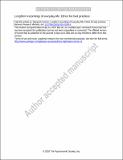Longform recordings of everyday life: Ethics for best practices
Author(s)
Cychosz, Margaret; Romeo, Rachel R; Soderstrom, Melanie; Scaff, Camila; Ganek, Hillary; Cristia, Alejandrina; Casillas, Marisa; de Barbaro, Kaya; Bang, Janet Y.; Weisleder, Adriana; ... Show more Show less
Download13428_2020_1365_ReferencePDF.pdf (1.674Mb)
Publisher Policy
Publisher Policy
Article is made available in accordance with the publisher's policy and may be subject to US copyright law. Please refer to the publisher's site for terms of use.
Terms of use
Metadata
Show full item recordAbstract
Recent advances in large-scale data storage and processing offer unprecedented opportunities for behavioral scientists to collect and analyze naturalistic data, including from underrepresented groups. Audio data, particularly real-world audio recordings, are of particular interest to behavioral scientists because they provide high-fidelity access to subtle aspects of daily life and social interactions. However, these methodological advances pose novel risks to research participants and communities. In this article, we outline the benefits and challenges associated with collecting, analyzing, and sharing multi-hour audio recording data. Guided by the principles of autonomy, privacy, beneficence, and justice, we propose a set of ethical guidelines for the use of longform audio recordings in behavioral research. This article is also accompanied by an Open Science Framework Ethics Repository that includes informed consent resources such as frequent participant concerns and sample consent forms.
Date issued
2020-02Department
McGovern Institute for Brain Research at MITJournal
Behavior Research Methods
Publisher
Springer Science and Business Media LLC
Citation
Cychosz, Margaret et al. "Behavior Research Methods." Behavior Research Methods 52, 5 (February 2020): 1951–1969 © 2020 The Psychonomic Society, Inc.
Version: Author's final manuscript
ISSN
1554-3528